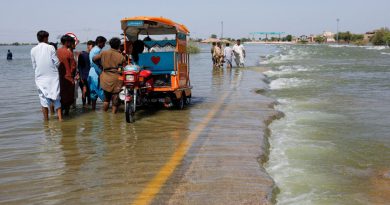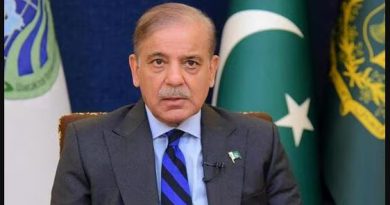Sudan rivals attempt another truce as civilians flee unrest
Khartoum (AP) — Sudan’s rival generals on Wednesday made a new attempt at a 24-hour humanitarian cease-fire after a failed truce the night before. But sporadic fighting continued, and aid groups said they needed guarantees and a wider window to help civilians trapped by five days of intense urban combat.
Terrified Sudanese fled Khartoum earlier in the day, hauling whatever belongings they could carry and trying to get out of the capital, where forces loyal to the country’s top two generals have been battling each other with tanks, artillery and airstrikes since Saturday.
The fighting became less intense in the first hours after the cease-fire took effect at 6 p.m., with sporadic clashes continuing in the city center, said Atiya Abdalla Atiya, secretary of the Doctors’ Syndicate, who is still in the capital. But he said neither side has provided guarantees to his group to facilitate movement of health care workers and ambulances.
Desperate residents of the capital have been running out of food and other supplies as they sheltered in their homes from the gun battles on the streets outside. Hospitals have been damaged and forced to close or have been overwhelmed by wounded, with staff exhausted and medical supplies depleted. Increasingly, armed fighters have turned to looting shops and robbing anyone who dares step outside.
Nearly 300 people have been killed in the past five days, the U.N. health agency said, but the toll is likely higher because many bodies lie uncollected in the streets.
In the tense hours after Wednesday’s cease-fire, Abdalla al-Tayeb joined other residents in collecting bodies near the main military headquarters, the scene of intense fighting. “All of them nearly rotted, causing a foul smell that reached our homes,” he said. “The scene was heinous.”
After the failure of Tuesday evening’s truce attempt, hundreds gave up on trying to hold out for calm and fled their homes throughout the day, even as explosions and gunfire shook Khartoum and the adjacent city of Omdurman. Residents of multiple neighborhoods told The Associated Press they could see men, women and children leaving with luggage, some on foot, others crowding into vehicles.
On Wednesday evening, the army and its rivals, the paramilitary Rapid Support Forces, separately announced that a new 24-hour truce had begun.
White House press secretary Karine Jean-Pierre called for both sides to adhere to the truce, “renounce violence and return to negotiations.” She said the army and the RSF “are responsible for ensuring the protections of civilians and non combatants.”
Until now, army chief Gen. Abdel Fattah Burhan, and RSF commander Gen. Mohammed Hamdan Dagalo — former allies against Sudan’s pro-democracy movement — have seemed determined to crush each other in their struggle for power.
Tuesday’s cease-fire attempt failed even after U.S. Secretary of State Antony Blinken spoke to each general by phone and after pressure from their regional allies. Egypt, which backs the Sudanese military, and Saudi Arabia and the United Arab Emirates, which have close ties to the RSF, have been calling on all sides to stand down.
Throughout the day Wednesday, the two sides battled around the main military headquarters in central Khartoum, which the RSF has tried repeatedly to capture, and the nearby airport. Residents said the military was pounding RSF positions with airstrikes.
The army’s monopoly on air power has appeared to give it an edge in fighting in Khartoum and Omdurman, enabling it to take several RSF bases over the past few days. But tens of thousands of fighters from the paramilitary force have fanned out across the city.
Residents say armed men, mostly in RSF uniforms, have raided homes, offices and shops in neighborhoods across Khartoum.
“They roam in small groups from house to house, from shop to shop and loot everything,” said a resident of the upscale neighborhood of Kafouri in northern Khartoum. “They storm your house and take all valuable things at gunpoint.”
The resident said many families began to take up arms to defend their properties. He and his brother guard their home at night, he said. “You don’t have another option.”
Another resident, in the Arab Market area, said men in RSF uniforms broke into mobile phone shops and took anything they could carry. The residents spoke on condition of anonymity, fearing reprisals.
Both sides in the conflict have a long history of human rights abuses. The RSF was born out of the Janjaweed militias, which were accused of widespread atrocities when the government deployed them to put down a rebellion in Sudan’s western Darfur region in the early 2000s.
Darfur has also seen heavy clashes in the past five days. The aid group Doctors Without Borders, or MSF after its French name, said armed men raided its compound in Nyala in Darfur, stealing vehicles and office equipment and looting a warehouse storing medical supplies. The International Committee of the Red Cross said its office in Nyala was also looted, with one vehicle taken.
Abdalla Hussein, the program manager for MSF, welcomed the truce but said 24 hours “is not enough” for sustained relief operations, particularly in remote areas.
Foreigners, including diplomats and aid workers, have also been trapped by the fighting,
German media, including the DPA news agency, reported that three A400M transport planes were dispatched to evacuate German citizens from Khartoum but turned around Wednesday due to security concerns. The Dutch government said it was sending a Hercules C-130 and an A330 to Jordan to be on standby but that “evacuations are not possible at the moment.” Japan said it was preparing to send military aircraft to evacuate about 60 Japanese nationals.
In Brussels, Dana Spinant, a spokeswoman for the European Commission, confirmed reports that a senior EU official had been shot and wounded in Sudan, without providing details. The New York Times identified the official as Wim Fransen, a Belgian national. Separately, gunmen broke into the EU ambassador’s residence and assaulted him this week, but a spokeswoman said he is back at work.
Hospitals in Khartoum are running dangerously low on medical supplies, often operating without power and clean water, the ICRC said in a statement. Dozens of health care facilities in Khartoum and around the country have stopped functioning because they are close to clashes, the Sudanese Doctors’ Syndicate said Wednesday. At least nine hospitals were bombed, it said.
The U.N.‘s World Health Organization said Wednesday at least 296 people have been killed and more than 3,000 wounded since fighting began, without offering a breakdown of civilians and combatants killed. The Doctors’ Syndicate, which monitors casualties, said Tuesday that at least 174 civilians have been killed and hundreds wounded.
The conflict between the military and the RSF has once again derailed Sudan’s transition to democratic rule after decades of dictatorship and civil war.
A popular uprising four years ago helped depose long-time autocrat Omar al-Bashir. But Burhan and Dagalo jointly carried out a 2021 coup. Both generals have a long history of human rights abuses, and their forces have cracked down on pro-democracy activists.
Under international pressure, Burhan and Dagalo recently agreed to a framework agreement with political parties and pro-democracy groups. But the signing was repeatedly delayed as tensions rose over the integration of the RSF into the armed forces and the future chain of command. ___ Magdy reported from Cairo. Associated Press writers Jon Gambrell in Dubai, United Arab Emirates, and Lorne Cook in Brussels contributed to this report.



